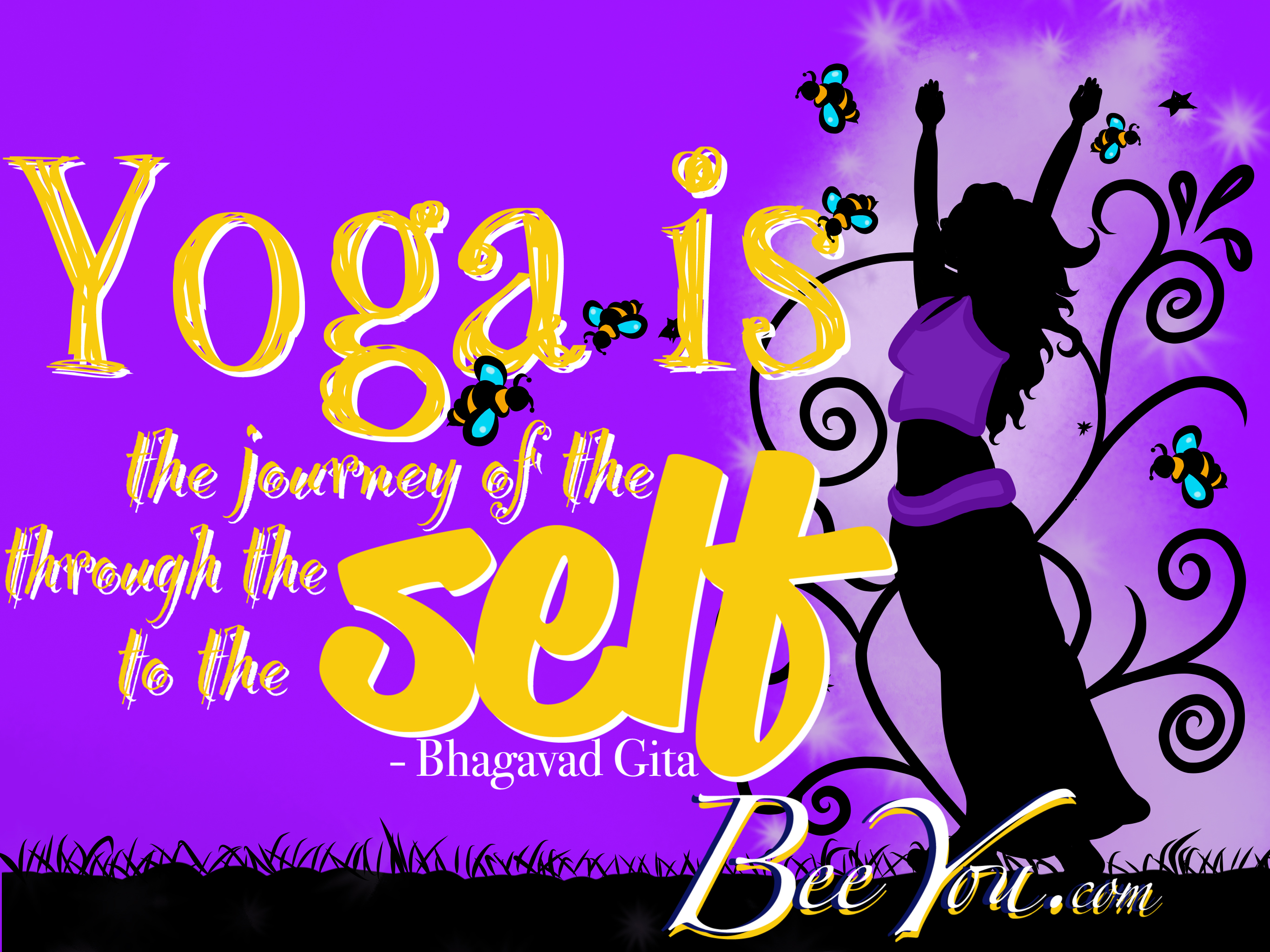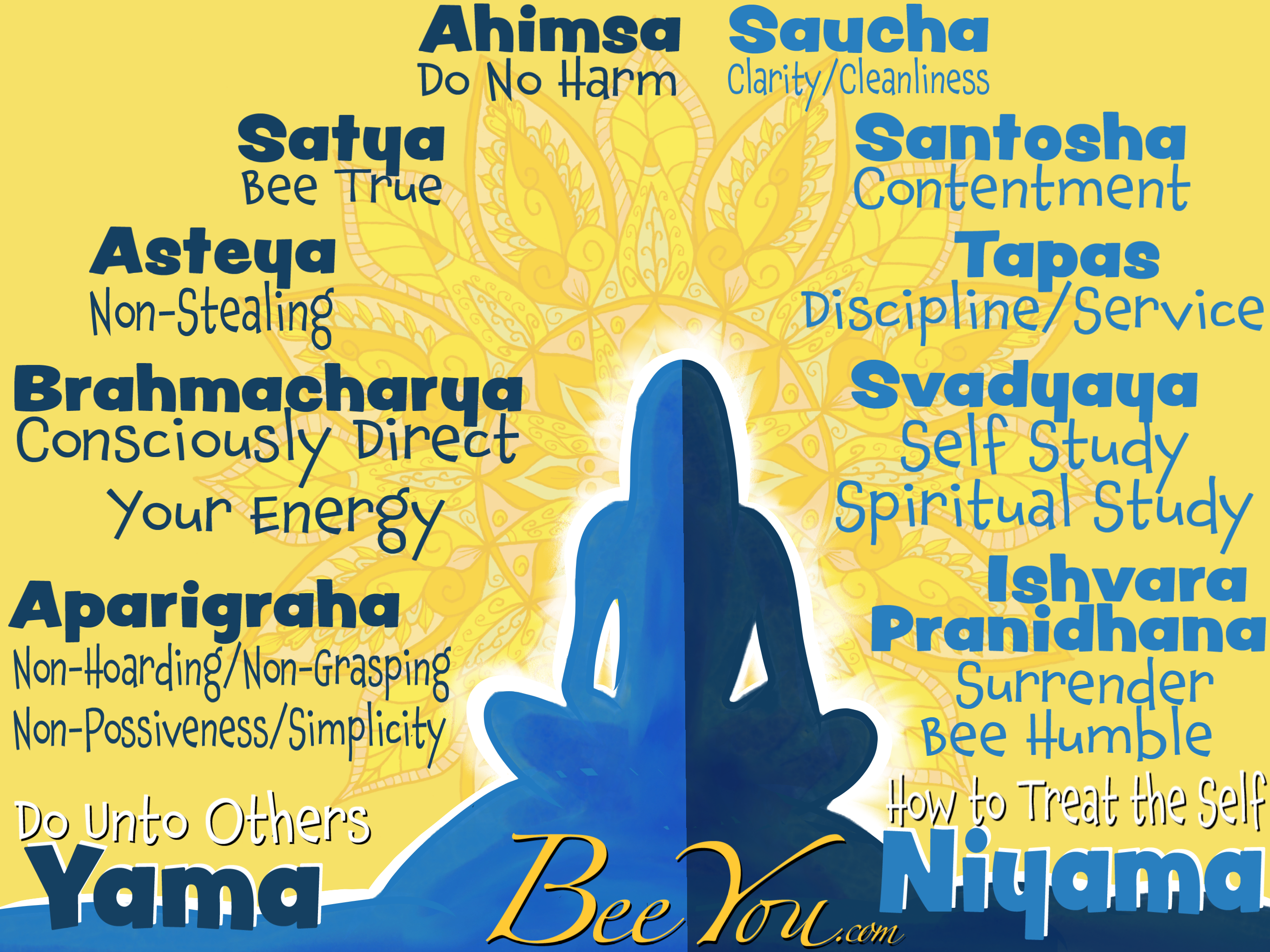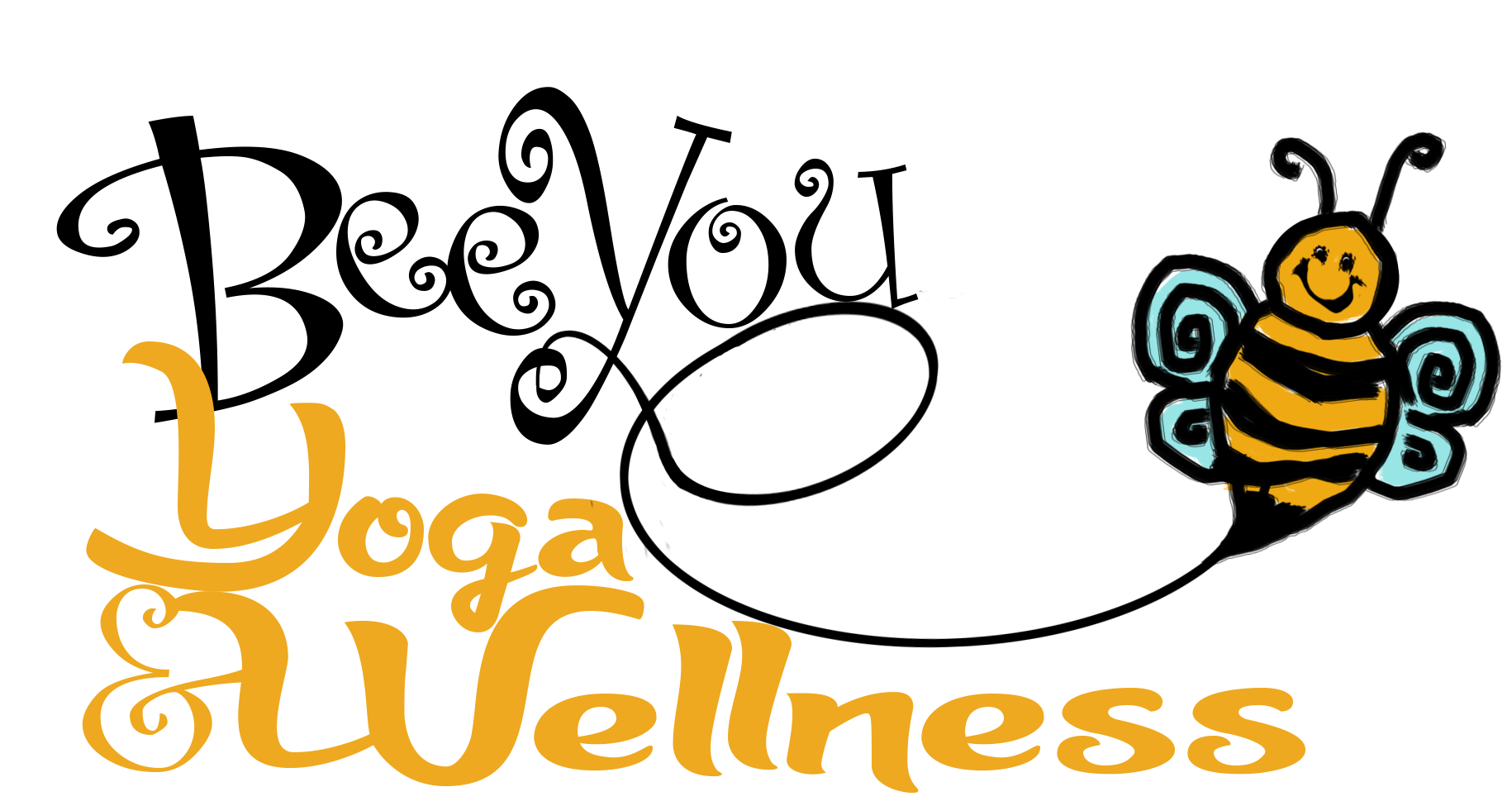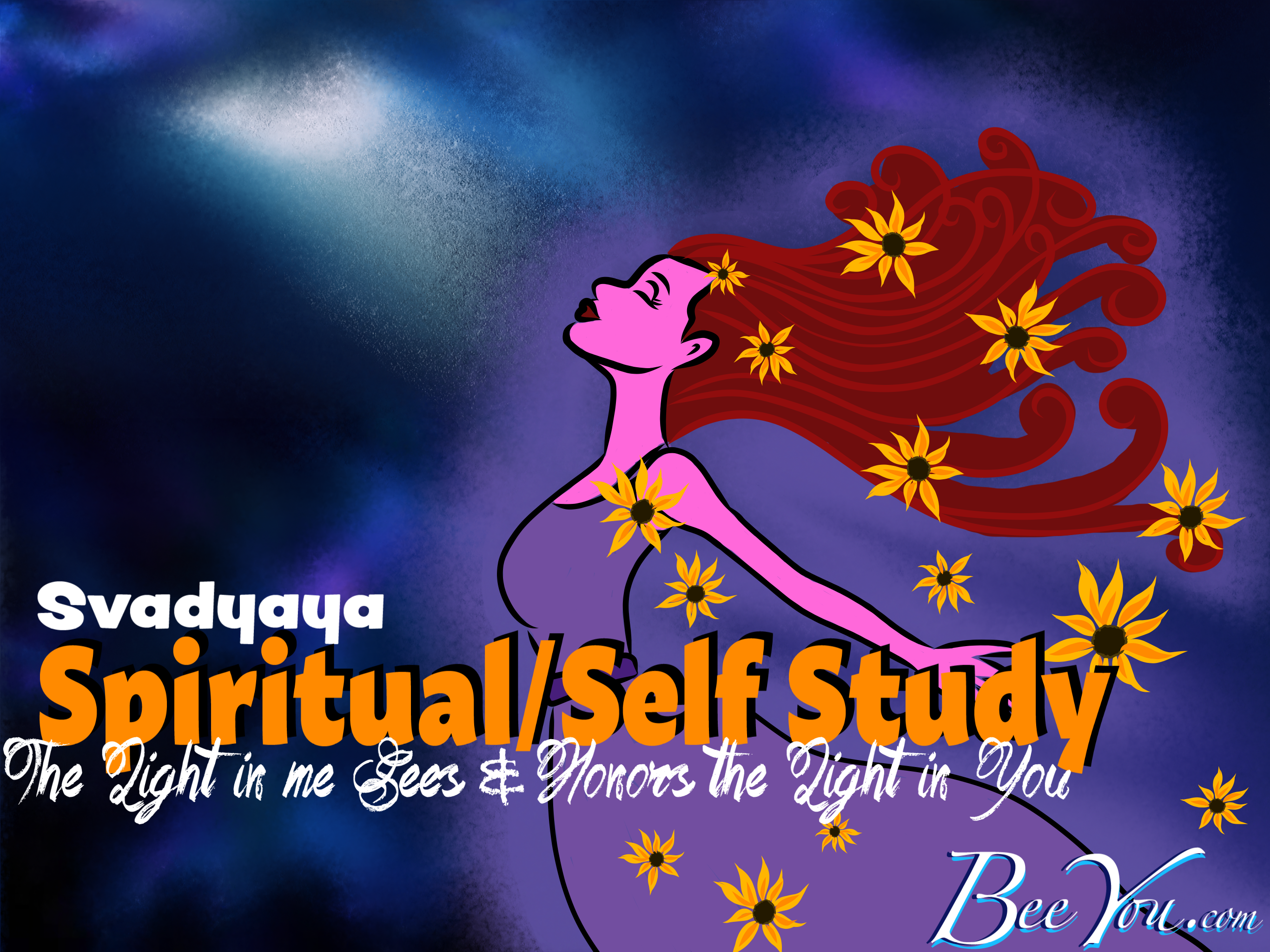The teachings of yoga have ethical principles that help guide us to a more comfortable way of living. Ethical principles need not be strict rules by which we judge the actions of others or something that divides us into “good” vs. “evil”. This guide provides a helpful method to break up the human experience and set us on a path that will provide more comfort in our everyday lives.
I often re-read these teachings, over and over, and seek out other people’s interpretations. I find that revisiting these teachings often highlights new ways I can incorporate them into my day to day life as I change. The following are some of the ways I have found to work for me.
The teachings are broken up into 2 parts, Niyama: how to treat ourselves and Yama: how to treat others. Each has 5 parts. The texts are written in an ancient language and have been through many translations into other languages and modern interpretations. It helps to open our minds to the more general message and how it might fit into our own modern life rather than trying to squeeze ourselves into someone else’s version of perfection or rules. The ancient language in which these texts were written is far more based on sound and vibration, more poetic than current language. Each word has many translations and many do not easily translate into current languages. It can be helpful to not get too caught up in the cognitive desperation for being exact and allow a more overall and deeper sense of the message to be absorbed. Listen with your innermost self and not so much your thinking mind. “Take what you need and leave the rest” but also invite the idea that at some other point in your life there may be new nuggets of wisdom that pop out that you may not have seen before. Look with fresh eyes and an open heart.
Niyama: How to treat the self
How can we know ourselves if we never study ourselves? It is entirely possible to move through our lives having no idea how our bodies react to our inner dialogue or how our inner dialogue reacts to self-reflection.
We see our own reality through a lens of personal experiences and the boxes we place ourselves in. When we look within we begin to understand the blur our experiences create. Yoga teaches us to gently lift the layers and look deeper. Below the thoughts, below the feelings, below the physical body, and below the layers of the job we do, the family member we are, or other labels we place on ourselves when we try to define “I am”. In the teachings of yoga, the innermost layer is the bliss layer. The innermost part of us. The essential nature. Some teachings call this our soul or our spirit. It is the part of us that remains unchanged by our experiences, thoughts, feelings. Our spark of life. This layer can become a great place of comfort. A source of inner healing.
For me, Self & Spiritual study has been the most beneficial and the most challenging of the teachings. After a traumatic experience when I was young I read the bible from start to finish, old and new testament. I was searching for answers (grasping). This lead to many questions, MANY. I went to my priest and began to ask my questions, this made my priest frustrated and caused a pretty big fall from faith for me. At 13, I was given the Bhagavad Gita and read it start to finish, more questions, more grasping… Since then I have read many spiritual and religious texts and it always seemed to lead in the same pattern without what I was searching for. I know along the way many teachers told me that what I was searching for comes from within but that just didn’t make sense, I was not ready to comprehend that concept. I was doing what I thought was the work, but I never seemed to be getting anywhere. It wasn’t until I opened myself to the possibility of experiencing the teachings of spiritual leaders with a more whole-body experience than trying to harness my cognitive mind into some exact definition of the meaning of life that things began to change. This was not an overnight or lightning strike event. This happened after many years of observing the patterns of my own behavior and thoughts.

When I was feeling particularly put off by an experience of members of a church acting in a cruel way, I mentioned to a friend “I cannot believe how clueless these people are to their cruel behavior and yet they pretend that they are good simply because they go to church”. My friend’s response has sat with me for years now and I often reflect on it when my own thoughts are being too judgy. “Church is like a hospital for the soul, people are not drawn there because they are healthy and living a perfect life, they go because they feel they need a little medicine or guidance.” Without knowing it, this friend gave me exactly the words I needed at that moment to do a little self-reflection. In seeing church and religion through the lens of my own experiences I was forming assumptions of other people. It was none of my business how other people lived their lives and what works for them and what may work for me is not better or worse, simply what works for me. Little by little I let go of my experience with religion and religious leaders. I opened my heart to seeing how other people seek to improve their wellbeing and enjoying the richness in how different our paths can be.
For me, it helps to think of spiritual study like listening to a song, when you hear a song that resonates with you your whole body experiences it. Find the spiritual leaders, poems, songs, books, teachings that make your soul sing. Have you ever tried too hard to cognitively explain why a poem or song is the one you love? Some things are just felt and the cognitive explanation can fall short of the actual experience.
The general meaning of all spiritual texts is to be nice to each other and the world will be a better place. From that thinking, I enter into listening to what works for spiritual leaders and try to feel the message of their experience. When I open my heart and turn off my judging mind, I often find little nuggets of wisdom that show up in my life in unexpected ways.
A very common way we continually inflict self-harm is the inner dialogue, that harsh little critic we carry around. We look in the mirror and judge ourselves as “too much” of one thing or another. We do something we regret and we might call ourselves names like stupid. The work of self-study and learning to do no harm to one’s self can have a profound impact on our lives. When we fire that inner critic and begin to treat ourselves with more kindness it becomes easier and easier to treat others with kindness and compassion. When you stop judging yourself, that emotional knee jerk judgment of others becomes less and less a controlling factor in your life. Sometimes when we do some inner work we can find ways to feel superior and the ego can start ruling the show “look at that angry person, they really need to do more yoga”. However, when you get deeper and really begin to incorporate 100% kindness and non-judgment to yourself you begin to see how truly large and difficult a task this can be. The continued effort of self-reflection makes it easier to stop judging others.

Yoga is not the goal of perfection. Practicing yoga is not the ultimate recipe for becoming perfectly happy and never experiencing pain or sadness. Yoga is a union. To join all of the parts of ourselves. To realize that we are a whole and complete being that is ever-changing, learning and growing, yet not broken. There can be imbalances and disruptions in parts of ourselves, in the thoughts, in the spiritual layer, in the emotions… but this does not make us broken. There are tools we can use to get to know where these imbalances might be and techniques we can use to guide us to a more balanced “wholeness”. Yoga can guide us to a more balanced life, a more comfortable way of being in this human experience.
It can be helpful to see these teachings as helpful guides that we can refer back to over and over. Think about the physical practice of tree pose. It teaches us to balance in our physical body, how balance requires attention not only to our muscles but to our breath, our mind, and our feelings. We balance in tree pose, we wobble, we fall, we try again. Often we learn more about the pose and what is happening in the whole system on the days when we wobble and fall. The object of practicing these concepts in our lives is not to achieve perfection but to notice when we wobble, revisit what we might like to try different, and try again.
These ethical guides need not be harsh rules by which we judge ourselves or others. The general idea is to Bee Kinder to ourselves and Kinder to each other and the world will flow a lot more harmoniously!

